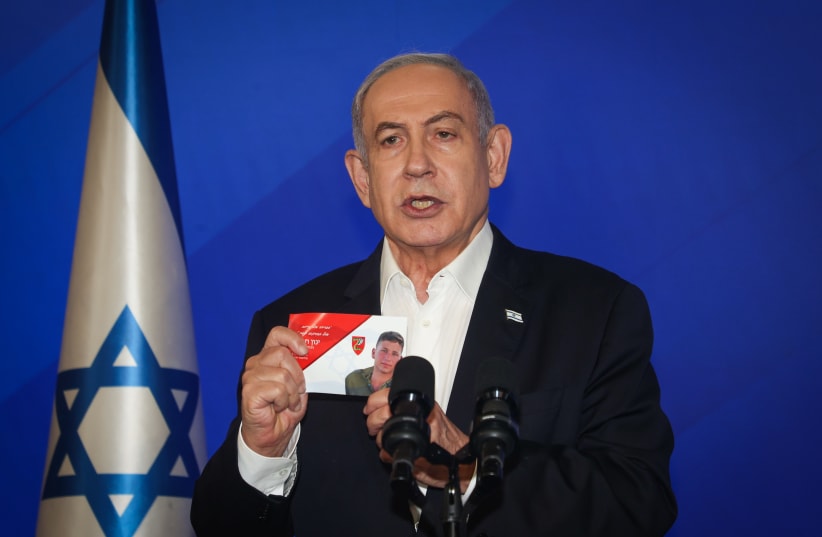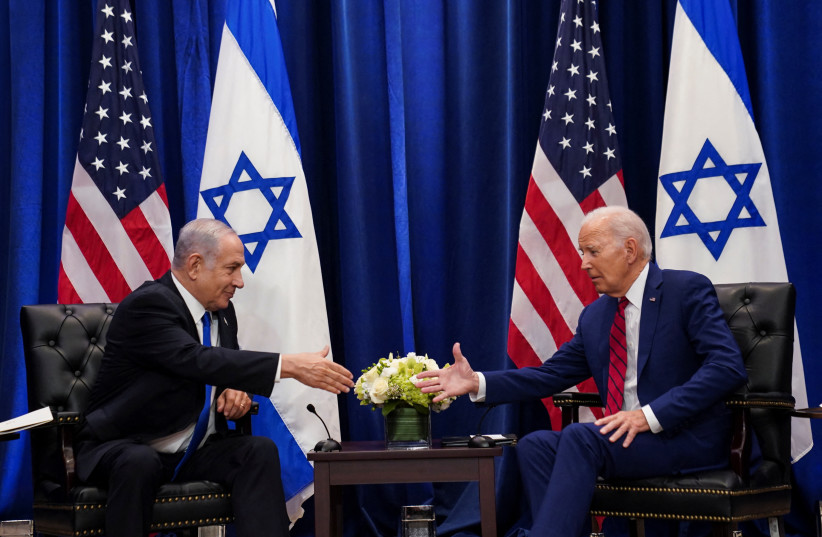This conflict between Israelis and Palestinians is not about the absence of a Palestinian state, but about the existence of the Jewish state, he said.
TOVAH LAZAROFF
JANUARY 18, 2024 22:38 Updated: JANUARY 18, 2024 22:40

Prime Minister Benjamin Netanyahu linked his political future with the prevention of a Palestinian Authority-run Palestinian state, precisely as the Biden administration has been pressuring Israel to return to a two-state diplomatic process.
“I can say something about what they call the day after Netanyahu. I do not love to speak of myself in the third person. But those who speak of the day after Netanyahu are talking about the creation of a Palestinian state led by the Palestinian Authority,” the Prime Minister told reporters during a press briefing in Tel Aviv.
This conflict between Israelis and Palestinians is not about the absence of a Palestinian state, but about the existence of the Jewish state, he said.
Netanyahu at odds with the Biden administration
Netanyahu’s words put him at odds with the Biden administration, which has been Israel’s main ally in its war against Hamas.
He spoke amid speculation about increased tension between him and US President Joe Biden about the day after plans for Gaza, with the US renewing its drive for a Saudi normalization deal. This time around, the deal would more clearly include an Israeli agreement to Palestinian statehood.
Reporters have noted that it’s been several weeks since the two have spoken, even though they have been in close contact since the start of the Gaza war on October 7.

US President Joe Biden holds a bilateral meeting with Israeli Prime Minister Benjamin Netanyahu on the sidelines of the 78th UN General Assembly in New York City, US, September 20, 2023. (credit: KEVIN LAMARQUE/REUTERS)
NBC reported on Wednesday that the Biden administration sought to circumvent Netanyahu by working to lay the groundwork for the day-after solutions through other Israeli politicians and civic society leaders.
In an interview with CNBC earlier this week, US Secretary of State Antony Blinken said that Arab nations would only fund the reconstruction of Gaza if Israel would agree to a path to Palestinian statehood. At the World Economic Forum, Saudi Prime Minister Faisal bin Farhan spoke of Palestinian statehood as part of a Saudi normalization deal.
According to NBC, Netanyahu rejected US and Saudi plans that include Palestinian statehood.
Public comments Netanyahu made during his Tel Aviv press conference, and those expressed by US State Department Matthew Miller seemed to indicate that the Prime Minister had indeed rebuffed initiatives tied to Palestinian statehood.
When quizzed about Netanyahu’s comments against Palestinian statehood, Miller said that Israel “faces some very difficult choices in the months ahead.”
Miller continued that “the conflict in Gaza is going to end. It will end, and at the end of that conflict, someone is going to have to rebuild Gaza, someone is going to have to govern Gaza, someone is going to have to provide security in Gaza.”
Blinken last week was able to secure commitments from Arab nations to rebuild Gaza and help establish Palestinian-led governance there, but they would only do so if there was a Palestinian state, Miller said.
The issue here is not just about Gaza, but rather how Israel resolves its long-term security issues, he said.
“For the first time in its history, you see the countries in the region who are ready to step up and further integrate with Israel, and provide real security assurance to Israel, and the US is ready to play its part, but they all have to have a willing partner on the other side,” Miller said.
The US will continue to explain that these are the opportunities and challenges before Israel, he said.
“There is no way to solve their long-term challenges, and there is no way to solve the short-term challenges” facing Palestinians and Israelis “without the establishment of a Palestinian state,” Miller said.
“We had direct conversations with him [Netanyahu], and now we are having a public conversation with him as well, but it’s going to be a process,” Miller explained.
In Tel Aviv, Netanyahu spoke with reporters about the problems connected to Israeli territorial withdrawal as a phenomenon and a strategic choice.
“Every territory that we withdraw from – terror is leveled against us,” Netanyahu said, explaining that this included southern Lebanon, Gaza, and the West Bank, which he referred to as Judea and Samaria.
This is why in any future arrangement, or even if there is not a future arrangement, “Israel must maintain security control over all the territory west of the Jordan River,” he said.
This conflicts with the idea of Palestinian sovereignty, but “there is nothing that can be done about that,” he said.
“I have explained this truth to the Americans,” he said, adding that he also prevented an attempt to impose on Israel a harmful reality.
“An Israeli Prime Minister has to be able to say ‘no’ even to our best friends. To say ‘no’ when it’s necessary and to say ‘yes’ when it’s possible,” Netanyahu said.
“This is how I behave. I have not only behaved this way, but doing so did not prevent me from enlarging the circle of peace to include four Arab nations,” Netanyahu said, referring to the 2020 Abraham Accords which normalized ties with the United Arab Emirates, Bahrain, and later Morocco.
He alluded to the possibility of a Saudi normalization deal, when he said that his diplomatic stances “will not prevent me, and I am determined to achieve this, from enlarging [the circle of peace] to include other countries in the region,” Netanyahu said.
He emphasized his determination to achieve complete victory in the Israel-Hamas war. This includes, he said, destroying the terror group, demilitarizing Hamas, local governance for Gaza, and securing the release of the hostages held in the enclave.
“The day after is the day after Hamas,” Netanyahu said, adding that many discussions have been held on this matter. It would be a mistake to begin local Palestinian governance in Gaza while Gaza is there because Hamas would likely kill those involved in civic rule.
Netanyahu emphasized that he was determined to continue the IDF military’s campaign in Gaza until Hamas was defeated.
He also pledged that he was doing everything possible to prevent a nuclear Iran, and assured the Israeli public that Israel was already executing attacks against it.
“Who says we are not attacking Iran? We are attacking,” Netanyahu said. “Iran is the head of the octopus and you see its tentacles all around, from the Houthis to Hezbollah to Hamas.”
“Iran is standing behind it. We have a conflict with Iran. Imagine not what Iran can do to us, to destroy us,” Netanyahu said.
He described a situation in which Israel is battling the proxies of the Islamic Republic on three fronts, Israel’s southern and northern borders, as well as in its waterways.
Given this reality, “imagine what [Iran] can do for the Middle East, to capture it, to destroy regimes, to control international maritime passages,” to say nothing of the global threat it presents, he said.
“Imagine, if this is what Iran is doing now, when it doesn’t have nuclear weapons, how critical it is that we stop it from acquiring nuclear weapons,” Netanyahu said.
Israel, under his leadership, has delayed Iran from producing nuclear weapons by at least 10 years, he claimed, adding that it could still do more but that he did not want to elaborate on what that was.
“I am obligated as the Prime Minister of Israel to prevent Iran from acquiring nuclear weapons, not just for our security and existence but for the protection of the entire world.”
Content retrieved from: https://www.jpost.com/israel-hamas-war/article-782828.